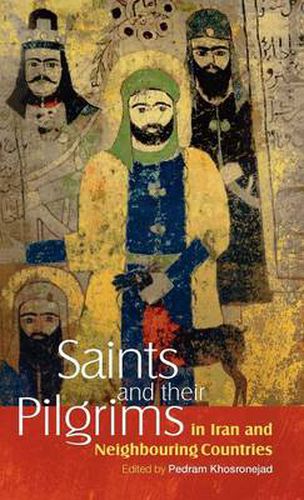Readings Newsletter
Become a Readings Member to make your shopping experience even easier.
Sign in or sign up for free!
You’re not far away from qualifying for FREE standard shipping within Australia
You’ve qualified for FREE standard shipping within Australia
The cart is loading…






This title is printed to order. This book may have been self-published. If so, we cannot guarantee the quality of the content. In the main most books will have gone through the editing process however some may not. We therefore suggest that you be aware of this before ordering this book. If in doubt check either the author or publisher’s details as we are unable to accept any returns unless they are faulty. Please contact us if you have any questions.
The importance and ramifications of saints, sainthood and pilgrimage in contemporary Iran and neighbouring countries are great, yet the academic conceptualizations of them and their entailments are sorely lacking. This book places the saints and their pilgrims in sharper focus, and offers important correctives to all-too-common Western misunderstandings, the foremost of which is the erroneous portrayal of Islam as primarily a body of legal doctrine and corresponding practice, and the associated principle that we can ‘know’ Islam if we ‘know’ Islamic law. In an effort to challenge such a limited, and limiting, perspective, this volume suggests that both anthropology, insofar as it can focus on experience and practice, and history, insofar as it can encompass more than an institutional/political ‘names and dates’ discourse, can reveal something of the dynamism of the faith, as more than the sum of its laws. The approaches demonstrated in this book on Shiite Pilgrimage offer windows into the beliefs and lives of ‘ordinary’ people, past and present, and thereby bring forth agendas akin to those of ‘subaltern studies’. Finally, the memorializing documented in these chapters provides evidence, past and present, of widespread desires for a more concrete, even immanent, relationship that is direct, unmediated and, at least partly, involves forms of intercession - even though such desires for immanence in the Islamic world have previously been considered as limited to devotees of the Sufi saints or the Shi'i Imams or their progeny.
$9.00 standard shipping within Australia
FREE standard shipping within Australia for orders over $100.00
Express & International shipping calculated at checkout
This title is printed to order. This book may have been self-published. If so, we cannot guarantee the quality of the content. In the main most books will have gone through the editing process however some may not. We therefore suggest that you be aware of this before ordering this book. If in doubt check either the author or publisher’s details as we are unable to accept any returns unless they are faulty. Please contact us if you have any questions.
The importance and ramifications of saints, sainthood and pilgrimage in contemporary Iran and neighbouring countries are great, yet the academic conceptualizations of them and their entailments are sorely lacking. This book places the saints and their pilgrims in sharper focus, and offers important correctives to all-too-common Western misunderstandings, the foremost of which is the erroneous portrayal of Islam as primarily a body of legal doctrine and corresponding practice, and the associated principle that we can ‘know’ Islam if we ‘know’ Islamic law. In an effort to challenge such a limited, and limiting, perspective, this volume suggests that both anthropology, insofar as it can focus on experience and practice, and history, insofar as it can encompass more than an institutional/political ‘names and dates’ discourse, can reveal something of the dynamism of the faith, as more than the sum of its laws. The approaches demonstrated in this book on Shiite Pilgrimage offer windows into the beliefs and lives of ‘ordinary’ people, past and present, and thereby bring forth agendas akin to those of ‘subaltern studies’. Finally, the memorializing documented in these chapters provides evidence, past and present, of widespread desires for a more concrete, even immanent, relationship that is direct, unmediated and, at least partly, involves forms of intercession - even though such desires for immanence in the Islamic world have previously been considered as limited to devotees of the Sufi saints or the Shi'i Imams or their progeny.